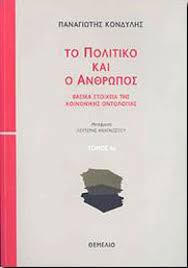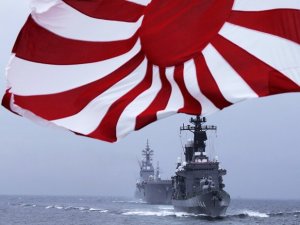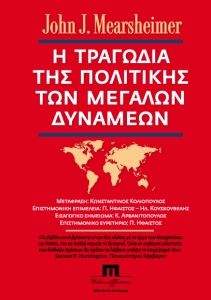Παναγιώτης Ήφαιστος
Είναι γνωστό ότι τα ινστιτούτα προτάσεων πολιτικής ή καθ’ υπερβολή ονομαζόμενα «δεξαμενές σκέψης» στα ισχυρά κράτη είναι κατά κόρον εξαρτημένα από την στρατηγική της χώρας στην οποία ανήκουν. Έχω γράψει στο παρελθόν ότι η διαφορά με «δεξαμενές σκέψης» στα μικρά και εξαρτημένα κράτη σε σύγκριση με τα ισχυρά και ηγεμονικά είναι ότι στην περίπτωση των ηγεμονικών οι «δεξαμενές» είναι εργαλεία της κρατικής στρατηγικής ενώ των εξαρτημένων εργαλεία των ξένων στρατηγικών. Διατρέχοντας λοιπόν το πρόσφατο κείμενο του Stratfor (βλ. στο τέλος του παρόντος)κάνουμε τα εξής σύντομα σχόλια.
Πρώτον, επιβεβαιώνονται αναλυτές που παρατηρώντας την στρατηγική των μεγάλων δυνάμεων (πχ το γνωστό «Άνοδος και πτώση των Αυτοκρατοριών» του PaulKennedy), διαπιστώνουν ότι για κάποιο μυστήριο λόγο κάποια στιγμή διαπράττουν φρικτά σφάλματα και αρχίζει η κατηφορική τους πορεία.
Εδώ, θα έλεγα ότι στις ΗΠΑ μη ακούγοντας στοχαστές της Θουκυδίδειας παράδοσης γέμισε το μυαλό τους με αέρα και πίστεψαν στην παραφιλολογία της «μοναδικής υπερδύναμης» της οποίας «η επιρροή θα φτάσει μέχρι εκεί που θα φτάσουν τα όπλα της». Είναι σημαντικό να πούμε, στο σημείο αυτό, ότι ενάντια σε αυτό το κύμα ανορθολογισμού φαίνονται να μην επικρατούν ορθολογικές θεωρήσεις ταγών της Θουκυδίδειας παράδοσης όπως οι Waltz, Mearsheimerή ακόμη και του Kissingerο οποίος σε πολύ ώριμη πλέον φάση και μακριά; από την πολιτική έχει θέαση των μεγάλων ανισορροπιών που δημιουργούνται και των εξαιρετικά ανορθολογικών στρατηγικών κινήσεων (βλ. και «Kissinger, Mearsheimer: Η Ρωσία, η Ουκρανία και η Αμερικανική στρατηγική» http://wp.me/p3OlPy-M6).
Δεύτερον, δεν είναι μόνο η υποβάθμιση των σοφών Παραδειγματικών αξιωμάτων τηςΘουκυδίδειας παράδοσης πάνω στην οποία εάν κανείς πατήσει βαδίζει με όρους ισορροπίας, στρατηγικού ορθολογισμού, μετριοπάθειας, νοηματοδότηση του οικείου συμφέροντος σε συνάρτηση με τους άλλους και βασανιστική συνεκτίμηση του κόστους και του οφέλους εναλλακτικών στάσεων κα ενεργειών (αυτό που στην στρατηγική θεωρία ονομάζουμε, εν γένει, «ορθολογιστική συμπεριφορά» των διπλωματικών επιλογών στην διεθνή πολιτική).
Είναι και κάτι άλλο που δεν εκτιμάται μόνο με όρους ποσοτικής ισχύος (προσέγγιση βασικά όλων των πολιτικών στοχαστών και πολιτικών ηγετών της Δύσης και μέχρι που υπήρχε κομμουνισμός των πρώην κομμουνιστικών κρατών). Είναι οι αόρατοι μηχανισμοί του «ταραχοποιού πνεύματος» που όπως και να το κάνουμε, για να θυμηθούμε τον Κονδύλη, ποτέ δεν έπαψε να είναι η κυριότερη διαμορφωτική δύναμη κάθε πολιτικού γεγονότος. [βλ. το τελευταίο μας δοκίμιο Τα κράτη επιδιώκουν να αποκτήσουν «ισχύ», η οποία είναι το κύριο «νόμισμα» στη διεθνή πολιτική (Waltz) http://wp.me/p3OlPy-AA και παραθέματα από τον Κονδύλη στο τέλος του παρόντος]
Στην Δύση βέβαια μεθυσμένοι από την πτώση της δήθεν αντιπάλου τους ΕΣΣΔδεν το έβλεπαν (και αυτή είναι η κουλτούρα τους στα πεδία της πολιτικής σκέψης). Δεν ήξεραν την σοφή ρήση του Κονδύλη, για παράδειγμα, ότι ο δικός τους υλισμός για μια δυνατότητα δήθεν ένωσης των ανθρώπων στην βάση μιας οικονομικής ανθρωπολογίας ήταν μορφικά πανομοιότυπος με αυτό των κομμουνιστών (παράθεμα στο τέλος) Έτσι κατέληξαν τώρα όταν στην μετά-αποικιακή εποχή «το πνεύμα εγέρθηκε δυναμικά» να μην μπορούν να το βλέπουν. Λειτουργούσαν και συνεχίζουν να λειτουργούν μυωπικά με αποτέλεσμα να αποφασίζουν και να δρουνανορθολογικά, σπασμωδικά και πιο συχνά ως ελέφαντες εν υαλοπωλείω, με τα γνωστά αποτελέσματα που όλοι βλέπουμε στην περιφέρειά μας.
Δεν λέω ότι μπορεί κανείς να σταθμίσει κα εκτιμήσει επακριβώς τα ταλαντώσεις του πνεύματος. Στο προαναφερθέν δοκίμιο σε αναφορά με τον Waltz και την ισχύ στην μεταψυχροπολεμική εποχή, υποστηρίζεται ότι η εκτίμηση των ταλαντώσεων του πνεύματος είναι υψηλού ρίσκου. Δεν σημαίνει όμως ότι μπορείς να κλείνεις τα μάτια σου μπροστά στο γεγονός ότι σήμερα υπάρχουν κράτη με πληθυσμούς εκατοντάδων εκατομμυρίων ή και πέραν του δισεκατομμυρίου τα οποία δεν είναι «δοχεία υλικής ισχύος» κατά την προσφιλή και ανόητη («επιστημονική» μην το συζητάς, πλην με αυτή είναι γαλουχημένο το πλείστο του ημέτερου εθνομηδενιστικού κινήματος – καθότι «κίνημα» είναι, όπως και διεθνώς, όχι επιστημονική προσέγγιση).
Σε αντίθεση με την γραμμική υλιστική θεώρηση του κόσμου μετά τον Ψυχρό Πόλεμο η αλήθεια είναι ότι ο «νέος κόσμος» (που όπως υποστήριξα μόλις το 1990 άρχισε να αποδεσμεύεται από τα αποικιακά δεσμά)είναι γεμάτος «πιστούς» διαφόρων ειδών, εκδοχών, εντάσεων και αστάθμητων συμπεριφορών. Δεν είναι κακό ή καλό αυτά παρά μόνο μια πραγματικότητα που δεν μπορείς να μην συνεκτιμάς στην στρατηγική σου.Επειδή ακριβώς δεν υπάρχει «μετρητής συμπεριφοράς των πιστών» η αναγκαιότητα για προσεκτικά βήματα και για στρατηγικό ορθολογισμό είναι ακόμη μεγαλύτερη.
Βασικά, το μόνο που μπορείς να κατορθώσεις … βομβαρδίζοντάς τους για να αυξήσεις δήθεν την επιρροή σου είναι να εξαπολύσεις εναντίον σου όλη την καταπιεσμένη ορμή που επί αιώνες καταδυναστευόταν κάτω από αποικιακές ή νέο-αποικιακές δομές ή και κάτω από πολιτικά μιλώντας αστεία –κυριολεκτικά αστεία– υλιστικά κράτη τα οποία όταν αναμενόμενα διαλύθηκαν δημιούργησαν δίνες μέσα στις οποίες αναμειγνύονται και εκρήγνυνται μίγματα πνεύματος, υλικών παραγόντων, μνημών, θρησκειών και οτιδήποτε άλλο μπορεί να φανταστεί κανείς ότι είναι ο «άνθρωπος».
Γιατί ακόμη και οι πνευματικά τυφλοί (λόγω εσχατολογικών δογμάτων) θα μπορούσαν να δουν ότι μετά την κατάρρευση των επίπλαστων εκατέρωθεν ιδεολογικών δογμάτων και προσδοκιών που κάθονταν πάνω στην φούσκα του αποικιακού και νέο-αποικιακού ηγεμονισμού, ο «άνθρωπος» ως συλλογικότητα και ως άτομο συμπεριφέρεται σύμφωνα με την φύση του: Δεν είναι «υλιστική στήλη» ή κατά τον Μαρκήσιο deSade που διατυπώνει με συνέπεια την υλιστική παραδοχή όταν λέει ότι «η ψυχή είναι σαλέματα της ύλης». Είναι ως άτομο και ως συλλογικότητα ένα εκρηκτικό μίγμα που στην καλύτερη περίπτωση διεξάγοντας εντός της οικείας Πολιτείας τον συλλογικό κατ’ αλήθειαν βίο με σύμμειξη και μέθεξη πνευματικών και αισθητών κατορθώνει να λειτουργεί πολιτικά πολιτισμένα. Δηλαδή δημοκρατικά ανοδικά.
Τρίτον, αφού λοιπόν κατεδαφίστηκε η υλιστική ουτοπία στις πρώην κομμουνιστικές χώρες και αφού το έτερον υλιστικό παράδειγμα της ευρωπαϊκής ολοκλήρωσης το 1992 δρομολόγησε την αυτοκτονία του (Ένωση με την οικονομική ανθρωπολογία της … ΟΝΕ), επί δύο δεκαετίες όλες οι πολιτικές παρακρούσεις των τριών τελευταίων αιώνων και όλα τα εσχατολογικά διεθνιστικά δόγματα συνοψίστηκαν και εκφράστηκαν στον μεταψυχροπολεμικό στρατηγικό ανορθολογισμό της δεσπόζουσας υπερδύναμης.
Δεσπόζουσα υπερδύναμη που θέλησε, κατά την γνωστή φράση υπερατλαντικής υφυπουργού εξωτερικών «να φτάσει μέχρι εκεί που φτάνουν τα όπλα της», μη σταθμίζοντας και εκτιμώντας σωστά το γεγονός ότι τα υπόλοιπα έξη δισεκατομμύρια άνθρωποι που για πρώτη φορά μετά την αποικιακή εποχή εγείρονταν αξιώνοντας θέση, δεν βρίσκονται πλέον υπό αποικιοκρατική καταστολή. Εξαρτημένα και συχνά αγόμενα και φερόμενα ναι, αλλά τίποτα δεν είναι γραμμικό πλέον όταν το «πνεύμα» δισεκατομμυρίων ανθρώπων εκρήγνυται, κυριολεκτικά. Στην εξίσωση αυτή θα πρέπει κανείς να λάβει υπόψη ότι στα πνευματικά μεστά έθνη πλέον που συμμετέχουν στην διεθνή πολιτική ενεργά συμπεριλαμβάνονται και πολλές αναδυόμενες υπερδυνάμεις που αξιώνουν ανάλογο ρόλο και θέση στον αστερισμό των μεγάλων (και ηγεμονικών) δυνάμεων.
Παραθέτουμε πιο κάτω την έκθεση του γνωστού Αμερικανικού ινστιτούτου για να κατανοήσουμε που οδηγεί αυτός ο ανορθολογισμός. Οδηγεί σε απελπισμένα συμπεράσματα που βλέπουν τους πάντες να συγκρούονται και να κατεδαφίζονται. Αυτό βέβαια δεν αποκλείεται και να συμβεί εάν η δεσπόζουσα υπερδύναμη συνεχίσει να βομβαρδίζει τους πάντες και τα πάντα. Η έκθεση του Stratforείναι μνημείο ανορθολογισμού γιατί όπως κανείς βλέπει αμέσως διαβάζοντάς την, ούτε που περνά από το μυαλό των ειδικών «προτάσεων πολιτικής» να δούνε τον κόσμο όπως είναι. Κάθονται ακόμη πάνω στο υψηλό βουνό των ψευδαισθήσεών τους και μη μπορώντας να αντιληφθούν ότι η υπευθυνότητα με επιδίωξη ισορροπίας στον κόσμο είναι μονόδρομος, απλά αρχίζουν να επιδίδονται στους αφορισμούς, στην καταστροφολογία και στην πρόβλεψη σεισμών, κατακλυσμών και καταποντισμών. Δεν μπορούν να δουν ορθολογιστικά ένα κόσμο γεμάτο καμπυλότητες. Τον βλέπουν γραμμικά και απλουστευτικά. Τόσο απλά και τόσο επικίνδυνα. Όπως ήδη αναφέρθηκε πιο πάνω, ταγοί της Θουκυδίδειας παράδοσης του προειδοποιούν τους Αμερικανούς από καιρό για το πόσο ανορθολογικά είναι όλα αυτά πλην ουδείς εκεί πέρα ακούει την βοή των επερχομένων γεγονότων. Μεγάλη η ευθύνη όταν είσαι ισχυρός και μεγάλη η ανευθυνότητα όταν δεν είσαι στρατηγικά ορθολογιστής.
Τέλος, κάτι που αφορά άμεσα και ζωτικά τα δικά μας προβλήματα. Σε σημαντική για τον υπογράφοντα μελέτη για συλλογικό τόμο στο εξωτερικό που δεν δημοσιεύτηκε ακόμη («The Big Europeanstates’s strategic cultures in historical and contemporary context and European integrationor Eurostrategics revisited»), επιχείρησα, στην γραμμή προγενέστερων διεθνολογικών εγχειρημάτων, να εξετάσω τα ευρωστρατηγικά ζητήματα. Δηλαδή το στρατηγικό υποσύστημα της Δυτικής πλευράς της Ευρασίας που πρακτικά σημαίνει τις στρατηγικές σχέσεις της Μεγάλης Βρετανίας, της Γαλλίας, της Ρωσίας και της Γερμανίας. Εξυπακούεται χωρίς να επηρεάζεται η ανάλυση από τους παραλογισμούς περί υπερεθνικής οικονομικής ανθρωπολογίας.
Μια τέτοια μελέτη σημαίνει βασικά τις νέες ισορροπίες μετά την μεγάλη ανακατανομή ισχύος του 1990. Παρά τις μεγάλες στρατηγικές ανακατατάξεις το 1990 δεν έλαβε χώρα μια νέα διάσκεψη ή ενός είδους νέο Κογκρέσο της Βιέννης που θα εξέταζε την νέα κατάσταση μετά τις γιγαντιαίες ανακατατάξεις. Αντί αυτού, όπως υπαινιχθήκαμε και πιο πάνω, η δεσπόζουσα δύναμη εκτέλεσε απίστευτου ανορθολογισμού επεμβάσεις και επιδόθηκε σε μια ανορθολογική στρατηγική που όξυνε τις στρατηγικές ανισορροπίες.
Αυτές οι ανορθολογικές στρατηγικές επιλογές εκτελούνταν, ιλαροτραγικά θα έλεγα, με χορωδία το σύστημα μη επιστημονικής προπαγάνδας που ενώ είχε στηθεί ως αντί-σοβιετικό εργαλείο τάχιστα εξελίχθηκε σε μηχανισμό φτηνής προπαγάνδας για το τέλος της ιστορίας, την παγκοσμιοποίηση και την σύγκρουση πολιτισμών. Συνεχίζει αυτό το ανορθολογικό σύστημα παρασίτων να ασκεί αρνητική επιρροή προκαλώντας ανορθολογισμό. Βασικά, επειδή είναι παρωχημένο, τίποτα δεν εξυπηρετεί, ούτε καν τα συμφέροντα αυτών που τα δημιούργησαν.Το σύστημα αυτό, εξάλλου, είναι διακλαδωμένο στα πανεπιστήμια όλου του πλανήτη όπου και τα παραμιλητά δεν έχουν όριο. Όλοι μαζί ζώντας στον παρωχημένο ιδεολογικό κόσμο τους επιδίδονται στην βιομηχανική παραγωγή πολιτικού και στρατηγικού ανορθολογισμού.
Στην Ευρώπη τα πράγματα εξελίχθηκαν σύμφωνα με την λογική που δημιούργησαν οι αποφάσεις του 1991-2. Όπως έλεγαν το 1991-2 δημόσια Γάλλοι και άλλοι ηγέτες, την επέβαλαν στην Γερμανία για να «δέσουν» δήθεν την επανενωμένη αυτή ευρωπαϊκή χώρα με νομισματικούς δεσμούς. Δηλαδή έδεσαν ένα γίγαντα με κλωστές και δημιούργησαν έτσι ένα τερατώδες χρηματοοικονομικό σύστημα αθέσμιστης διανεμητικής ισχύος.
Αναμενόμενα και λογικά η ισχυρότερη οικονομική δύναμη, η Γερμανία, γιγαντώθηκε. Η άνιση ανάπτυξη γιγαντώθηκε, τα εμπορικά ανισοζύγια αντίστοιχα και το ισχυρότερο κράτος γιγαντώθηκε οικονομικά και εμπορικά. Αναμενόμενα όπως μερικοί γράψαμε τότε. Ολοκληρώνω λοιπόν λέγοντας ότι στο προαναφερθέν μη δημοσιευμένο δοκίμιό μου, τα συμπεράσματα για τις ανισορροπίες στην Δυτική πλευρά της Ευρασίας σε συνάρτηση με τις πλανητικές εξελίξεις, διαπιστώνεται ότι δημιουργείται μια εκρηκτική στρατηγική κατάσταση.
Πρώτον, οι ανακατανομές ισχύος στο τετράγωνο Βρετανία, Γαλλία, Γερμανία, Ρωσία διευρύνουν ολοένα και περισσότερο μια κατάσταση ανισορροπίας ενώ στο κέντρο της Ευρώπης προκαλούν ένα μεγάλο και επικίνδυνο κενό ισχύος που κανένα «Κογκρέσο της Βιέννης» δεν επιχείρησε να διαχειριστεί όταν για πρώτη φορά το 1990 έλαβε χώρα η μεγάλη ανακατανομή ισχύος λόγω πτώσης της ΕΣΣΔ και επανένωσης της Γερμανίας. Σε ένα τέτοιο ρευστό σύστημα μεγαλύτερων ανισορροπιών υπάρχουν πολλά άλλα «κενά πολιτικού και στρατηγικού ορθολογισμού».
Δεύτερον, η κυριαρχία κοντόφθαλμων προσεγγίσεων επειδή επί έξη δεκαετίες η Ευρώπη είχε την πολυτέλεια μέσα στο «στρατηγικό θερμοκήπιο» των ΗΠΑ να επιδίδεται και να επιτυγχάνει ολοκλήρωση στα καταναλωτικά πεδία, δημιούργησε ένα κενό στρατηγικής σκέψης. Ακόμη και στην Γερμανία, μιας πλέον οικονομικής υπερδύναμης, υπάρχει κενό στρατηγικής θεωρίας του κράτους. Κάθε σοβαρός Γερμανός θα το παραδεχθεί και οι κοντόφθαλμες συμπεριφορές της τωρινής κυβέρνησης κατά της Ελλάδας και άλλων κρατών το επιβεβαιώνουν καθημερινά.
Τρίτον, θα πρέπει να λάβουμε υπόψη ότι οι τέσσερεις μεγάλες Ευρωπαϊκές δυνάμεις (Βρετανία, Γαλλία, Γερμανία, Ρωσία) σε πλανητικό πεδίο καθίστανται πλέον ολοένα και περισσότερο «μεσαίες μεγάλες δυνάμεις» με αποτέλεσμα να επηρεάζονται χωρίς να μπορούν να επηρεάσουν το αναδυόμενο πολυπολικό σύστημα στο πλανητικό πεδίο. Επιπλέον, λόγω διαιώνισης της στρατηγικής εξάρτησης από τις ΗΠΑ μετά το 1990 επηρεάζονται ολοένα και περισσότερο από την αργή πλην σημαντική μετατόπιση του κέντρου βάρους της Αμερικής Ανατολικά και από τις κρατικά και εθνικά προσδιορισμένες ταλαντώσεις της Αμερικανικής στρατηγικής.
Τέταρτον, τα κεκτημένα της ευρωπαϊκής ολοκλήρωσης είναι η μεγάλη εξαρτημένη μεταβλητή των στρατηγικών εξελίξεων και των στρατηγικών αποφάσεων των τεσσάρων μεγάλων ευρωπαϊκών δυνάμεων και άλλων αναδυόμενων δυνάμεων. Δεν μιλώ για τηνεξ αντικειμένου τερατώδη ΟΝΕ η οποία εάν υπήρχε πολιτικός ορθολογισμός στην Ευρώπη και με βάση τις θέσεις των ίδιων των πρωταγωνιστών έπρεπε να είχε από καιρό αποσυναρμολογηθεί συντεταγμένα για να ελαχιστοποιηθούν οι ζημιές και οι ανισορροπίες.
Δεν μιλώ επίσης για το γιγαντιαίο ιστορικό σφάλμα της Ελλάδας (αλλά και των τεχνοκρατών που ιδιοτελώς λειτουργώντας το δέχθηκαν με «πειραγμένα στατιστικά») να εισέλθει ανέτοιμη, απροετοίμαστα και άσκοπα –μια χαρά μέλος της ΕΕ ήταν με δυνατότητα δημοσιονομικής ευελιξίας και ορθολογικών πολιτικοοικονομικών αποφάσεων– στον λάκκο των λεόντων της ΟΝΕ (ΟΝΕ: Ο μηχανισμός της καταστροφής και έγκαιρες προειδοποιήσεις http://wp.me/p3OlPy-CS) χωρίς καν να είναι στοιχειωδώς έτοιμη η χώρα να ανταγωνιστεί τα οικονομικά μεγαθήρια ή να αντιμετωπίσει τον όχλο κερδοσκόπων και τοκογλύφων που ανορθολογικά κυριαρχούν μέσα στις τεχνόσφαιρες της διεθνούς και ευρωπαϊκής οικονομικής και πολιτικής διακυβέρνησης.
Αναφέρομαι στις καθαρά στρατηγικές αποφάσεις που ενώ είναι εξόχως διαμορφωτικές καμιά συνεννόηση δεν υπάρχει μεταξύ των μεγάλων δυνάμεων της Ευρώπης. Με όρους στρατηγικής θεωρίας ο στρατηγικός ανορθολογισμός στην Ευρώπη αυξάνεται μέρα με την μέρα χωρίς να διαφαίνεται τρόπος αντιμετώπισής του. Ο μεγάλος εχθρός είναι η … Ελλάδα που υπήρξε και το μεγαλύτερο θύμα του ελλείμματος διεθνούς και ευρωπαϊκής οικονομικής και πολιτικής διακυβέρνησης. Η Ελλάδα θα πρέπει να ξέρει ότι υπό αυτές τις συνθήκες θα πρέπει να αντιμετωπίσει αυτή την κατάσταση με όρους αυτοβοήθειας και ότι η τακτική της προηγούμενης διακυβέρνησης δεν σημαίνει μόνο θάνατο αλλά κάτι πιο βασανιστικό, αργό θάνατο.
Πέμπτο, εύκολη διέξοδος για την Ελλάδα δεν υπάρχει. Η μη βιώσιμη προγενέστερη καθοδική πορεία αργού θανάτου με σημαία ένα μη βιώσιμο χρέος χωρίς δυνατότητα ανάπτυξης ήταν ολοφάνερη σε όσους δεν είναι πολιτικά τυφλοί. Η χαιρέκακη αναμονή και προσδοκία των εξουσιαστών που έφυγαν προκαλεί θλίψη. Η αποτυχία μας και η καταστροφή μας θα τους δικαιώσει!!Εξ αντικειμένου, το μόνο που μπορεί να γίνει είναι να επιδιωχθεί μια σκληρή και ανελαστική διαπραγμάτευση στην βάση βιώσιμων οικονομικών διεξόδων –και με αξιόπιστες διαπραγματευτικές θέσεις στις οποίες όλοι θα πρέπει να συμβάλουν– η οποία εάν αποδώσει η αναπόδραστη πάλη μας να επιβιώσουμε με το να σταθούμε όρθιοι είναι μονόδρομος. Επιτυχία σημαίνει καθολική υποστήριξη στο εσωτερικό μέτωπο της Ελλάδας. Οτιδήποτε άλλο είναι αυτοκτονικό, κυρίως εάν αφεθούμε να παρασυρθούμε από εγκάθετα … ποτάμια μέσα στα οποία ρέει δηλητήριο (λέω με νόημα).
Η νέα διακυβέρνηση απέδειξε ότι υπό προϋποθέσεις θα μπορούσε να ελαχιστοποιήσει τις ζημιές και να μην καταστούμε τα μεγάλα θύματα μιας παντελώς ανορθολογικής διεθνούς και ευρωπαϊκής οικονομικής και πολιτικής διακυβέρνησης. Αυτό πέραν των αυτονόητων θυσιών που πρέπει να είμαστε έτοιμοι να κάνουμε (για τον εαυτό μας και όχι, αυτή την φορά, για τους ξένους) απαιτείται καθολική και ταυτόχρονα κριτική στήριξη των διαπραγματευτικών προσεγγίσεων της νέας συλλογικής διακυβέρνησης από τους πολίτες, τους επιχειρηματίες και την διασπορά.
Σε αντίθετη περίπτωση θα υποστούμε τις φρικτές συνέπειες πρώτον του πολιτικοοικονομικού εγκλήματος ένταξης στην ΟΝΕ το 2001-2 και δεύτερον της αλληλουχίας φρικτών λαθών των πέντε τελευταίων χρόνων όταν υπακούοντας τυφλά στην τεχνόσφαιραφθάσαμε πολύ κοντά στο χείλος της αβύσσου. Το Ελληνικό κοινωνικό σώμα με την ψήφο του στις 25 Ιανουαρίου σταμάτησε την διολίσθηση στην άβυσσο. Τώρα ήλθε η ώρα να συνεχίσει να λειτουργεί με όρους αυτοσυντήρησης και επιβίωσης,
Παράρτημα αποσπασμάτων του Κονδύλη και η έκθεση του Stratfor
 Κονδύλης – αποσπάσματα από τον ωκεανό της Κονδύλειας περιγραφικής θεωρίας
Κονδύλης – αποσπάσματα από τον ωκεανό της Κονδύλειας περιγραφικής θεωρίας
Πολιτική και μεταφυσικές κατασκευές
«Οι πραγματιστές δεν είναι σε θέση να αντιληφθούν την απτή χρησιμότητα των “μεταφυσικών” κατασκευών μέσα στον κοινωνικό αγώνα για ισχύ. Ίσως να είναι “καθ’ αυτό” (διάβαζε: από την σκοπιά φιλελεύθερων ωφελιμιστικών αντιλήψεων) αδιάφορο, ποια ιδέα περί Θεού πρεσβεύει κάποιος, ωστόσο η πρακτική διαφορά γίνεται τεράστια, αν υπάρχουν άνθρωποι, οι οποίοι για την ιδέα τους περί Θεού είναι πρόθυμοι να πεθάνουν ή να σκοτώσουν, αφού συνδέουν μαζί της τη δική τους ταυτότητα» (1991, σ. 106).
Χυδαίος μαρξισμός με αντεστραμμένα πρόσημα
«Καταλαβαίνουμε έτσι γιατί οι φιλελεύθεροι πολιτικοί και οικονομολόγοι, οι οποίοι παρά τις συνεχείς έμπρακτες διαψεύσεις των τριών τελευταίων αιώνων, εξακολουθούν να διατείνονται ότι το εμπόριο θα υποκαταστήσει τον πόλεμο, υποπίπτουν σ’ ένα τεράστιο λογικό και ιστορικό σφάλμα. Μόνον όποιος ενστερνίζεται έναν οικονομικό ντετερμινισμό, δηλαδή μόνον όποιος αποδίδει τους πολέμους σε οικονομικούς ανταγωνισμούς και μόνον, δικαιούται λογικά να πιστεύει ότι η οικονομική συνεργασία θα καταργήσει τους πολέμους. Στο κρίσιμο αυτό σημείο, όπως και σε πολλά άλλα ακόμη, ο οικονομιστικός φιλελευθερισμός δεν είναι τίποτα άλλο παρά χυδαίος μαρξισμός με αντεστραμμένα πρόσημα» (1997 σ. 366). Σ’ άλλη περίπτωση, γράφει πως αυτές οι φορμαλιστικές μυθολογίες, όπως εύστοχα τις ονομάζει, ουσιαστικά υποστηρίζουν πως μέσα στο ίδιο θεσμικό-διαδικαστικό πλαίσιο μπορούν να συνυπάρξουν πολύ διαφορετικές κοσμοθεωρητικές θέσεις και να πραγματωθεί η ανοχή όλων προς όλους. Αλλά ακόμη και μια μικρή εμβάθυνση στα πραγματικά δεδομένα, συνεχίζει, «επιτρέπει τη διαπίστωση ότι το σύγχρονο δυτικό “κράτος δικαίου” χρειάζεται λειτουργικά, εξ ίσου όσο και οποιοσδήποτε άλλος πολιτικοκοινωνικός σχηματισμός, μια κυρίαρχη ιδεολογία συνυφασμένη με ανθρωπολογικά αξιώματα» (1994β σ. 127,128).
Εθνικιστές και «ουραγοί ή σφογγοκωλάριοι»
«(για όσους από τον τα αριστερά παραληρήματα πέρασαν ευθέως στον νεοφιλελευθερισμό καταλήγοντας έτσι, αντί να καταγγέλλουν τον ιμπεριαλισμό να κεραυνοβολούν «κάθε εθνικισμό» και ενστερνιζόμενοι τον οικουμενισμό μέσω της ενιαίας παγκόσμιας αγοράς και των «ανθρωπίνων δικαιωμάτων») «Δεν αναρωτιούνται ούτε ποιος θα τα ερμηνεύσει δεσμευτικά κάθε φορά τι σημαίνουν αυτά τα «δικαιώματα» στον συγκεκριμένο τόπο και χρόνο, ούτε αν και πόσο δικαιολογείται ο «εθνικισμός» όποτε ένας μικρός θέλει να αντισταθεί στις αδηφάγες διαθέσεις ενός μεγάλου. Με τον τρόπο αυτό, ενώ ηθικολογούν αδιάκοπα, στην πραγματικότητα συμπαρατάσσονται με το δίκαιο του ισχυρότερου. Αλλά αν ο ηττημένος αποδεχόμενος όψιμα την ιδεολογία του νικητή γίνεται συχνά ο γελοιωδέστερος και γλοιωδέστερος φορέας της, δεν είναι βέβαια ο πρωταρχικός εμπνευστής και θεμελιωτής της. Η «αριστερά» έχοντας μετατραπεί σε ουραγό ή σφογγοκωλάριο του αμερικανισμού, δεν αντλεί πλέον από ό,τι ζωντανότερο είχε η μαρξιστική παράδοση, δηλαδή την ανελέητη απομυθοποίηση των φιλελεύθερων ιδεολογημάτων, αλλά τρέφεται από μια κοινωνική θεωρία που εν μέρει αντικατοπτρίζει και εν μέρει συγκαλύπτει εξιδανικευτικά τις πραγματικές σχέσεις ισχύος μέσα στην δυτική μαζική δημοκρατία» (2000).
Το κείμενο του Stratfor
Analysis

A deactivated Soviet-era SS-4 medium range nuclear capable ballistic missile displayed at La Cabana fortress in Havana, on Oct. 13, 2012.
This is the fifth Decade Forecast published by Stratfor. Every five years since 1996 (1996, 2000, 2005, 2010 and now, 2015) Stratfor has produced a rolling forecast. Overall, we are proud of our efforts. We predicted the inability of Europe to survive economic crises, China’s decline and the course of the U.S.-jihadist war. We also made some errors. We did not anticipate 9/11, and more important, we did not anticipate the scope of the American response. But in 2005 we did forecast the difficulty the United States would face and the need for the United States to withdraw from its military engagements in the Islamic world. We predicted China’s weakness too early, but we saw that weakness when others were seeing the emergence of an economy larger than that of the United States. Above all, we have consistently forecast the enduring power of the United States. This is not a forecast rooted in patriotism or jingoism. It derives from our model that continues to view the United States as the pre-eminent power.
We do not forecast everything. We focus on the major trends and tendencies in the world. Thus, we see below some predictions from our 2010 Decade Forecast:
We see the U.S.-jihadist war subsiding. This does not mean that Islamist militancy will be eliminated. Attempts at attacks will continue, and some will succeed. However, the two major wars in the region will have dramatically subsided if not concluded by 2020. We also see the Iranian situation having been brought under control. Whether this will be by military action and isolation of Iran or by a political arrangement with the current or a successor regime is unclear but irrelevant to the broader geopolitical issue. Iran will be contained, as it simply does not have the underlying power to be a major player in the region beyond its immediate horizons.
The diversity of systems and demographics that is Europe will put the European Union’s institutions under severe strain. We suspect the institutions will survive. We doubt that they will work very effectively. The main political tendency will be away from multinational solutions to a greater nationalism driven by divergent and diverging economic, social and cultural forces. The elites that have crafted the European Union will find themselves under increasing pressure from the broader population. The tension between economic interests and cultural stability will define Europe. Consequently, inter-European relations will be increasingly unpredictable and unstable.
Russia will spend the 2010s seeking to secure itself before the demographic decline really hits. It will do this by trying to move from raw commodity exports to process commodity exports, moving up the value chain to fortify its economy while its demographics still allow it. Russia will also seek to reintegrate the former Soviet republics into some coherent entity in order to delay its demographic problems, expand its market and above all reabsorb some territorial buffers. Russia sees itself as under the gun, and therefore is in a hurry. This will cause it to appear more aggressive and dangerous than it is in the long run. However, in the 2010s, Russia’s actions will cause substantial anxiety in its neighbors, both in terms of national security and its rapidly shifting economic policies.
The states most concerned — and affected — will be the former satellite states of Central Europe. Russia’s primary concern remains the North European Plain, the traditional invasion route into Russia. This focus will magnify as Europe becomes more unpredictable politically. Russian pressure on Central Europe will not be overwhelming military pressure, but Central European psyches are finely tuned to threats. We believe this constant and growing pressure will stimulate Central European economic, social and military development.
China’s economy, like the economies of Japan and other East Asian states before it, will reduce its rate of growth dramatically in order to calibrate growth with the rate of return on capital and to bring its financial system into balance. To do this, it will have to deal with the resulting social and political tensions.
From the American point of view, the 2010s will continue the long-term increase in economic and military power that began more than a century ago. The United States remains the overwhelming — but not omnipotent — military power in the world, and produces 25 percent of the world’s wealth each year.
The Decade Ahead
The world has been restructuring itself since 2008, when Russia invaded Georgia and the subprime financial crisis struck. Three patterns have emerged. First, the European Union entered a crisis that it could not solve and that has increased in intensity. We predict that the European Union will never return to its previous unity, and if it survives it will operate in a more limited and fragmented way in the next decade. We do not expect the free trade zone to continue to operate without increasing protectionism. We expect Germany to suffer severe economic reversals in the next decade and Poland to increase its regional power as a result.
The current confrontation with Russia over Ukraine will remain a centerpiece of the international system over the next few years, but we do not think the Russian Federation can exist in its current form for the entire decade. Its overwhelming dependence on energy exports and the unreliability of expectations on pricing make it impossible for Moscow to sustain its institutional relations across the wide swathe of the Russian Federation. We expect Moscow’s authority to weaken substantially, leading to the formal and informal fragmentation of Russia. The security of Russia’s nuclear arsenal will become a prime concern as this process accelerates later in the decade.
We have entered a period in which the decline of the nation-states created by Europe in North Africa and the Middle East is accelerating. Power is no longer held by the state in many countries, having devolved to armed factions that can neither defeat others nor be defeated. This has initiated a period of intense internal fighting. The United States is prepared to mitigate the situation with air power and limited forces on the ground but will not be able or willing to impose a settlement. Turkey, whose southern border is made vulnerable by this fighting, will be slowly drawn into the fighting. By the end of this decade, Turkey will emerge as the major regional power, and Turkish-Iranian competition will increase as a result.
China has completed its cycle as a high-growth, low-wage country and has entered a new phase that is the new normal. This phase includes much slower growth and an increasingly powerful dictatorship to contain the divergent forces created by slow growth. China will continue to be a major economic force but will not be the dynamic engine of global growth it once was. That role will be taken by a new group of highly dispersed countries we call the Post-China 16, which includes much of Southeast Asia, East Africa and parts of Latin America. China will not be an aggressive military force either. Japan remains the most likely contender for the dominant position in East Asia, both because of its geography and because of its needs as a massive importer.
The United States will continue to be the major economic, political and military power in the world but will be less engaged than in the past. Its low rate of exports, its increasing energy self-reliance and its experiences over the last decade will cause it to be increasingly cautious about economic and military involvement in the world. It has learned what happens to heavy exporters when customers cannot or will not buy their products. It has learned the limits of power in trying to pacify hostile countries. It has learned that North America is an arena in which it can prosper with selective engagements elsewhere. It will face major strategic threats with proportional power, but it will not serve the role of first responder as it has in recent years.
It will be a disorderly world, with a changing of the guard in many regions. The one constant will be the continued and maturing power of the United States — a power that will be much less visible and that will be utilized far less in the next decade.
Europe

EU flags fly outside the European Commission headquarters in Brussels, during gas talks between the EU, Russia and Ukraine on Oct. 30, 2014.
The European Union will be unable to solve its fundamental problem, which is not the eurozone, but the free trade zone. Germany is the center of gravity of the European Union; it exports more than 50 percent of its GDP, and half of that goes to other EU countries. Germany has created a productive capability that vastly outstrips its ability to consume, even if the domestic economy were stimulated. It depends on these exports to maintain economic growth, full employment and social stability. The European Union’s structures — including the pricing of the euro and many European regulations — are designed to facilitate this export dependency.
This has already fragmented Europe into at least two parts. Mediterranean Europe and countries such as Germany and Austria have completely different behavioral patterns and needs. No single policy can suit all of Europe. This has been the core problem from the beginning, but it has now reached an extreme point. What benefits one part of Europe harms another.
Nationalism has already risen significantly. Compounding this is the Ukrainian crisis and Eastern European countries’ focus on the perceived threat from Russia. Eastern Europe’s concern about Russia creates yet another Europe — four, total, if we separate the United Kingdom and Scandinavia from the rest of Europe. Considered with the rise of Euroskeptic parties on the right and left, the growing delegitimation of mainstream parties and the surging popularity of separatist parties within European countries, the fragmentation and nationalism that we forecast in 2005, and before, is clearly evident.
These trends will continue. The European Union might survive in some sense, but European economic, political and military relations will be governed primarily by bilateral or limited multilateral relationships that will be small in scope and not binding. Some states might maintain a residual membership in a highly modified European Union, but this will not define Europe.
What will define Europe in the next decade is the re-emergence of the nation-state as the primary political vehicle of the continent. Indeed the number of nation-states will likely increase as various movements favoring secession, or the dissolution of states into constituent parts, increase their power. This will be particularly noticeable during the next few years, as economic and political pressures intensify amid Europe’s crisis.

A visitor reaches for of the one of the first mugs of beer after the tapping of the first barrel during the opening ceremony for the 180th Oktoberfest at the Hofbraeu tent in Munich September 21, 2013.
Germany has emerged from this mass of nation-states as the most economically and politically influential. Yet Germany is also extremely vulnerable. It is the world’s fourth-largest economic power, but it has achieved that status by depending on exports. Export powers have a built-in vulnerability: They depend on their customers’ desire and ability to buy their products. In other words, Germany’s economy is hostage to the economic well-being and competitive environment in which it operates.
There are multiple forces working against Germany in this regard. First, Europe’s increasing nationalism will lead to protectionist capital and labor markets. Weaker countries are likely to adopt various sorts of capital controls, while stronger countries will limit the movement of foreigners — including the citizens of other EU countries — across their borders. We forecast that existing protectionist policies inside the European Union, particularly on agriculture, will be supplemented in coming years by trade barriers created by the weaker Southern European economies that need to rebuild their economic base after the current depression. On a global basis, we can expect European exports to face increased competition and highly variable demand in the uncertain environment. Therefore, our forecast is that Germany will begin an extended economic decline that will lead to a domestic social and political crisis and that will reduce Germany’s influence in Europe during the next 10 years.
At the center of economic growth and increasing political influence will be Poland. Poland has maintained one of the most impressive growth profiles outside of Germany and Austria. In addition, though its population is likely to contract, the contraction will most probably be far less than in other European countries. As Germany undergoes wrenching shifts in economy and population, Poland will diversify its own trade relationships to emerge as the dominant power on the strategic Northern European Plain. Moreover, we expect Poland to be the leader of an anti-Russia coalition that would, significantly, include Romania during the first half of this decade. In the second half of the decade, this alliance will play a major role in reshaping the Russian borderlands and retrieving lost territories through informal and formal means. Eventually as Moscow weakens, this alliance will become the dominant influence not only in Belarus and Ukraine, but also farther east. This will further enhance Poland’s and its allies’ economic and political position.
 Poland will benefit from having a strategic partnership with the United States. Whenever a leading global power enters into a relationship with a strategic partner, it is in the global power’s interest to make the partner as economically vigorous as possible, both to stabilize its society and to make it capable of building a military force. Poland will be in that position with the United States, as will Romania. Washington has made its interest in the region obvious.
Poland will benefit from having a strategic partnership with the United States. Whenever a leading global power enters into a relationship with a strategic partner, it is in the global power’s interest to make the partner as economically vigorous as possible, both to stabilize its society and to make it capable of building a military force. Poland will be in that position with the United States, as will Romania. Washington has made its interest in the region obvious.Russia

A boy stands on top of a heap of snow in the Red Square, with St. Basil’s Cathedral seen in the background, in central Moscow December 25, 2014.
It is unlikely that the Russian Federation will survive in its current form. Russia’s failure to transform its energy revenue into a self-sustaining economy makes it vulnerable to price fluctuations. It has no defense against these market forces. Given the organization of the federation, with revenue flowing to Moscow before being distributed directly or via regional governments, the flow of resources will also vary dramatically. This will lead to a repeat of the Soviet Union’s experience in the 1980s and Russia’s in the 1990s, in which Moscow’s ability to support the national infrastructure declined. In this case, it will cause regions to fend for themselves by forming informal and formal autonomous entities. The economic ties binding the Russian periphery to Moscow will fray.
Historically, the Russians solved such problems via the secret police — the KGB and its successor, the Federal Security Services (FSB). But just as in the 1980s, the secret police will not be able to contain the centrifugal forces pulling regions away from Moscow this decade. In this case, the FSB’s power is weakened by its leadership’s involvement in the national economy. As the economy falters, so does the FSB’s strength. Without the FSB inspiring genuine terror, the fragmentation of the Russian Federation will not be preventable.
To Russia’s west, Poland, Hungary and Romania will seek to recover regions lost to the Russians at various points. They will work to bring Belarus and Ukraine into this fold. In the south, the Russians’ ability to continue controlling the North Caucasus will evaporate, and Central Asia will destabilize. In the northwest, the Karelian region will seek to rejoin Finland. In the Far East, the maritime regions more closely linked to China, Japan and the United States than to Moscow will move independently. Other areas outside of Moscow will not necessarily seek autonomy but will have it thrust upon them. This is the point: There will not be an uprising against Moscow, but Moscow’s withering ability to support and control the Russian Federation will leave a vacuum. What will exist in this vacuum will be the individual fragments of the Russian Federation.
This will create the greatest crisis of the next decade. Russia is the site of a massive nuclear strike force distributed throughout the hinterlands. The decline of Moscow’s power will open the question of who controls those missiles and how their non-use can be guaranteed. This will be a major test for the United States. Washington is the only power able to address the issue, but it will not be able to seize control of the vast numbers of sites militarily and guarantee that no missile is fired in the process. The United States will either have to invent a military solution that is difficult to conceive of now, accept the threat of rogue launches, or try to create a stable and economically viable government in the regions involved to neutralize the missiles over time. It is difficult to imagine how this problem will play out. However, given our forecast on the fragmentation of Russia, it follows that this issue will have to be addressed, likely in the next decade.
The issue in the first half of the decade will be how far the alliance stretching between the Baltic and Black seas will extend. Logically, it should reach Azerbaijan and the Caspian Sea. Whether it does depends on what we have forecast for the Middle East and Turkey.
The Middle East and North Africa
 The Middle East — particularly the area between the Levant and Iran, along with North Africa — is experiencing national breakdowns. By this we mean that the nation-states established by European powers in the 19th and 20th centuries are collapsing into their constituent factions defined by kinship, religion or shifting economic interests. In countries like Libya, Syria and Iraq, we have seen the devolution of the nation-state into factions that war on each other and that cross the increasingly obsolete borders of countries.
The Middle East — particularly the area between the Levant and Iran, along with North Africa — is experiencing national breakdowns. By this we mean that the nation-states established by European powers in the 19th and 20th centuries are collapsing into their constituent factions defined by kinship, religion or shifting economic interests. In countries like Libya, Syria and Iraq, we have seen the devolution of the nation-state into factions that war on each other and that cross the increasingly obsolete borders of countries.
This process follows the model of Lebanon in the 1970s and 1980s, when the central government ceased to function and power devolved to warring factions. The key factions could not defeat the others, nor could they themselves be defeated. They were manipulated and supported from the outside, as well as self-supporting. The struggle among these factions erupted into a civil war — one that has quieted but not ended. As power vacuums persist throughout the region, jihadist groups will find space to operate but will be contained in the end by their internal divisions.
This situation cannot be suppressed by outside forces. The amount of force required and the length of deployment would outstrip the capacity of the United States, even if dramatically expanded. Given the situation in other parts of the world, particularly in Russia, the United States can no longer focus exclusively on this region.
 At the same time, this evolution, particularly in the Arab states south of Turkey, represents a threat to regional stability. The United States will act to mitigate the threat of particular factions, which will change over time, through the use of limited force. But the United States will not deploy multidivisional forces to the region. At this point, most countries in the area still expect the United States to act as the decisive force even though they witnessed the United States fail in this role in the past decade. Nevertheless, expectations shift more slowly than reality.
At the same time, this evolution, particularly in the Arab states south of Turkey, represents a threat to regional stability. The United States will act to mitigate the threat of particular factions, which will change over time, through the use of limited force. But the United States will not deploy multidivisional forces to the region. At this point, most countries in the area still expect the United States to act as the decisive force even though they witnessed the United States fail in this role in the past decade. Nevertheless, expectations shift more slowly than reality.
As the reality sinks in, it will emerge that, because of its location, only one country has an overriding interest in stabilizing Syria and Iraq, is able to act broadly — again because of its location — and has the means to at least achieve limited success in the region. That country is Turkey. At this point, Turkey is surrounded by conflicts in the Arab world, in the Caucasus and in the Black Sea Basin. But Turkey has avoided taking risks so far.
Turkey will continue to need U.S. involvement for political and military reasons. The United States will oblige, but there will be a price: participation in the containment of Russia. The United States does not expect Turkey to assume a war-fighting role and does not intend one for itself. It does, however, want a degree of cooperation in managing the Black Sea. Turkey will not be ready for a completely independent policy in the Middle East and will pay the price for a U.S. relationship. That price will open the path to extending the containment line to Georgia and Azerbaijan.

Turkish soldiers carry Turkish flags during a parade marking the 89th anniversary of Victory Day in Ankara on August 30, 2011.
We expect the instability in the Arab world to continue through the decade. We also expect Turkey to be drawn in to the south, inasmuch as its fears of fighting so close to its border — and the political outcomes of that fighting — will compel it to get involved. It will intervene as little as possible and as slowly as possible, but it will intervene, and its intervention will eventually increase in size and breadth. Whatever its reluctance, Turkey cannot withstand years of chaos across its border, and there will be no other country to carry the burden. Iran is not in a position geographically or militarily to perform this function, nor is Saudi Arabia. Turkey is likely to try to build shifting coalitions ultimately reaching into North Africa to stabilize the situation. Turkish-Iranian competition will grow with time, but Turkey will keep its options open to work with both Iran and Saudi Arabia as needed. Whatever the dynamic, Turkey will be at the center of it.
This will not be the only region drawing Turkey’s attention. As Russia weakens, European influence will begin inching eastward into areas where Turkey has historical interests, such as the northern shore of the Black Sea. We can foresee Turkey projecting its power northward certainly commercially and politically but also potentially in some measured military way. Moreover, as the European Union fragments and individual economies weaken or some nations become oriented toward the East, Turkey will increase its presence in the Balkans as the only remaining power able to do so.
Before this can happen, Turkey must find a domestic political balance. It is both a secular and Muslim country. The current government has attempted to bridge the gap, but in many ways it has tilted away from the secularists, of whom there are many. A new government will certainly emerge over the coming years. This is a permanent fault line in contemporary Turkey. Like many countries, its power will expand in the midst of political uncertainty. Alongside this internal political conflict, the military, intelligence and diplomatic service will need to evolve in size and function during the coming decade. That said, we expect to see an acceleration of Turkey’s emergence as a major regional power in the next 10 years.
East Asia
 China has ceased to be a high-growth, low-wage economy. As China’s economy slows, the process of creating and organizing an economic infrastructure to employ low-wage workers will be incremental. What can be done quickly in a port city takes much longer in the interior. Therefore, China has normalized its economy, as Japan did before it, and as Taiwan and South Korea did in 1997. All massive expansions climax, and the operations of the economies shift.
China has ceased to be a high-growth, low-wage economy. As China’s economy slows, the process of creating and organizing an economic infrastructure to employ low-wage workers will be incremental. What can be done quickly in a port city takes much longer in the interior. Therefore, China has normalized its economy, as Japan did before it, and as Taiwan and South Korea did in 1997. All massive expansions climax, and the operations of the economies shift.
The problem for China in the next decade are the political and social consequences of that shift. The coastal region has been built on high growth rates and close ties with European and American consumers. As these decline, political and social challenges emerge. At the same time, the expectation that the interior — beyond parts of the more urbanized Yangtze River Delta — will grow as rapidly as the coast is being dashed. The problem for the next decade will be containing these difficulties.
 Beijing’s growing dictatorial tendencies and an anti-corruption campaign, which is actually Beijing’s assertion of its power over all of China, provide an outline of what China would like to see in the next decade. China is following a hybrid path that will centralize political and economic powers, assert Party primacy over the military, and consolidate previously fragmented industries like coal and steel amid the gradual and tepid implementation of market-oriented reforms in state-owned enterprises and in the banking sector. It is highly likely that a dictatorial state coupled with more modest economic expectations will result. However, there is a less likely but still conceivable outcome in which political interests along the coast rebel against Beijing’s policy of transferring wealth to the interior to contain political unrest. This is not an unknown pattern in China, and, though we do not see this as the most likely course, it should be kept in mind. Our forecast is the imposition of a communist dictatorship, a high degree of economic and political centralization and increased nationalism.
Beijing’s growing dictatorial tendencies and an anti-corruption campaign, which is actually Beijing’s assertion of its power over all of China, provide an outline of what China would like to see in the next decade. China is following a hybrid path that will centralize political and economic powers, assert Party primacy over the military, and consolidate previously fragmented industries like coal and steel amid the gradual and tepid implementation of market-oriented reforms in state-owned enterprises and in the banking sector. It is highly likely that a dictatorial state coupled with more modest economic expectations will result. However, there is a less likely but still conceivable outcome in which political interests along the coast rebel against Beijing’s policy of transferring wealth to the interior to contain political unrest. This is not an unknown pattern in China, and, though we do not see this as the most likely course, it should be kept in mind. Our forecast is the imposition of a communist dictatorship, a high degree of economic and political centralization and increased nationalism. China cannot easily turn nationalism into active aggression. China’s geography makes such actions on land difficult, if not impossible. The only exception might be an attempt to take control of Russia’s maritime interests if we are correct and Russia fragments. Here, Japan likely would challenge China. China is building a large number of ships but has little experience in naval warfare and lacks the experienced fleet commanders needed to challenge more experienced navies, including the U.S. Navy.
China cannot easily turn nationalism into active aggression. China’s geography makes such actions on land difficult, if not impossible. The only exception might be an attempt to take control of Russia’s maritime interests if we are correct and Russia fragments. Here, Japan likely would challenge China. China is building a large number of ships but has little experience in naval warfare and lacks the experienced fleet commanders needed to challenge more experienced navies, including the U.S. Navy.
Japan has the resources to build a significantly larger navy and a more substantial naval tradition. In addition, Japan is heavily dependent on imports of raw materials from Southeast Asia and the Persian Gulf. Right now it depends on the United States to guarantee access. But given that we are forecasting more cautious U.S. involvement in foreign ventures and that the United States is not dependent on imports, the reliability of the United States is in question. Therefore, the Japanese will increase their naval power in the coming years.
 Fighting over the minor islands producing low-cost and unprofitable energy will not be the primary issue in the region. Rather, an old three-player game will emerge. Russia, the declining power, will increasingly lose the ability to protect its maritime interests. The Chinese and the Japanese will both be interested in acquiring these and in preventing each other from having them. We forecast this as the central, unsettled issue in the region as Russia declines and Sino-Japanese competition increases.
Fighting over the minor islands producing low-cost and unprofitable energy will not be the primary issue in the region. Rather, an old three-player game will emerge. Russia, the declining power, will increasingly lose the ability to protect its maritime interests. The Chinese and the Japanese will both be interested in acquiring these and in preventing each other from having them. We forecast this as the central, unsettled issue in the region as Russia declines and Sino-Japanese competition increases.Post-China Manufacturing Hubs
International capitalism requires a low-wage, high-growth region for high rewards on risk capital. In the 1880s it was the United States, for example. China was the most recent region, replacing Japan. No one country can replace China, but we have noted 16 countries with a total population of about 1.15 billion people where entry-level manufacturing has gone after leaving China.
Aναδημοσίευση του άρθρου «Stratfor has 11 alarming predictions for the next decade» (ΠΗΓΗ)






Δεν υπάρχουν σχόλια:
Δημοσίευση σχολίου
Σημείωση: Μόνο ένα μέλος αυτού του ιστολογίου μπορεί να αναρτήσει σχόλιο.